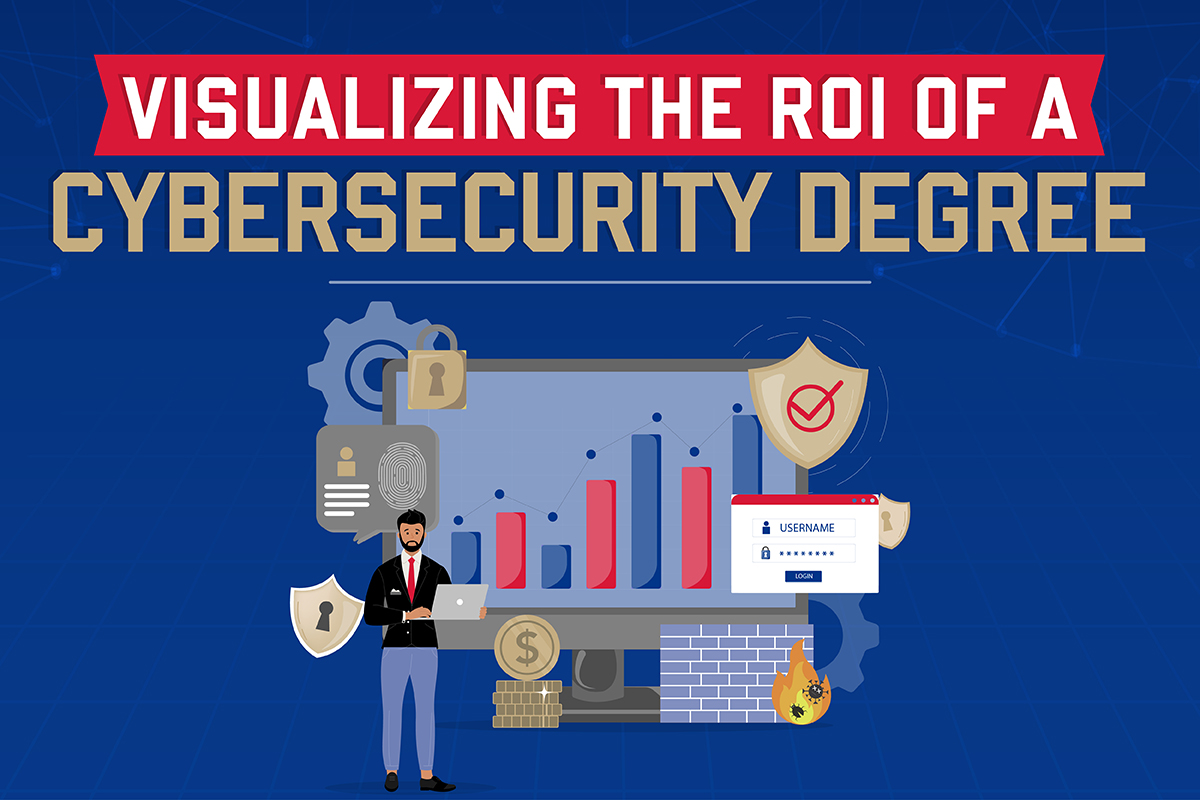Cybersecurity Certificate vs. Degree: Which Is Right for You?
Written by:
University of Tulsa
• Jul 9, 2024

Cybersecurity threats are abundant and have become more sophisticated. A 2023 report from the Identity Theft Resource Center found 3,122 data breaches and more than 353 million total victims of data compromises. To combat this alarming uptick, companies and organizations need qualified cybersecurity professionals to stay proactive, understand the risks, troubleshoot, and quickly implement solutions.
Cybersecurity refers to the protection of personal data, intellectual property, and system infrastructure from attacks, terrorism, and other crimes. To work in this field, individuals typically need formal training.
You should consider several factors when deciding between a cybersecurity certificate vs. a degree; ultimately, the decision should reflect your passion, experience, and goals. For example, a certificate program may be more attractive if you’re new to the field, while an online Master of Science (M.S.) in Cyber Security can help advance your knowledge and prepare you for certifications and higher-ranking positions.
What’s a Cybersecurity Certificate?
Cybersecurity certificates are short pathways to learning that can appeal to beginners and experienced individuals looking to build their skill sets. Two types of certificates exist: strictly entry-level with no experience and a postgraduate program for experienced professionals seeking career advancement.
A certificate isn’t a certification. The terms may be used interchangeably, but they represent different accomplishments. A certificate is awarded at the end of an educational program, while a certification validates specialty expertise with a credential.
What’s a Cybersecurity Degree?
Undergraduate and graduate cybersecurity degree programs are available that span two to four years. These options provide a more comprehensive understanding of cybersecurity principles, solutions, and challenges. Many programs offer specialized tracks, areas of concentration, and electives to support various areas of interest.
Cybersecurity Certificate vs. Degree: Differences and Similarities
Is a master’s degree in cybersecurity worth it? Is a certificate enough to enter the cybersecurity workforce? Let’s break down the most common considerations.
Time to Completion
Certificate programs are shorter and can typically be completed in less than a year. This option would be ideal for individuals seeking faster entry into cybersecurity through entry-level positions. However, some employers seek a degree for analyst and specialist roles.
Cybersecurity degree programs require a longer time commitment, typically spanning two to four years. Individuals with a four-year bachelor’s degree can usually complete a master’s degree program in approximately two years or less, depending on the program.
Curriculum
Cybersecurity certificate programs are typically more concentrated on a specific topic or series of related subjects. These programs help fill a gap in learning or allow students to explore areas of interest.
The curriculum for a cybersecurity master’s degree program typically includes foundational technical concepts, such as malware and data loss, along with the latest cybersecurity technologies. Graduate-level programs are geared toward students with some technical background, enabling them to comprehend fundamental concepts.
Career Aspirations
Cybersecurity certificates are short programs that offer training in specialized areas to complement one’s basic knowledge and provide specific skills. This can be helpful for roles that require specialized or niche skill sets.
By contrast, degree programs offer a broader view of a chosen field, making candidates more marketable for a wider array of jobs. Many schools offer cybersecurity internships and resources to help guide students as they navigate their career options, network, and develop their technical skills.
Salary and Employment Projections
As noted, selecting a cybersecurity certificate or a degree program depends on factors such as time commitment, financial situation, and career goals; however, there can also be significant salary and job outlook differences.
The U.S. Bureau of Labor Statistics (BLS) reported a 32% job outlook for information security analysts, a field that includes the cybersecurity sector, from 2022 to 2032. The BLS also notes that many of these professionals enter the field with a degree and related experience.
As for salary, positions requiring a degree may offer higher salaries than those requiring just a certificate. Positions requiring a degree may include cybersecurity manager, information security analyst, and cybersecurity engineer. On the other hand, common entry-level certificate jobs include information technology support technician or network tester.
Why Choose a Cybersecurity Degree?
A bachelor’s or master’s degree in cybersecurity covers a spectrum of topics that align with what employers may look for in candidates. These programs may cover fundamental and advanced content, such as cyber law and policy, penetration testing, and cryptography. A degree may also be a stepping stone for a professional certification, which can lead to more career opportunities and a higher income potential.
Launch Your Cybersecurity Career With Help From The University of Tulsa
Deciding between a cybersecurity certificate vs. degree is a personal decision and depends on key career and lifestyle factors. Both options have positives and negatives, and you should examine them closely to determine what’s best for your situation.
The University of Tulsa’s online M.S. in Cyber Security degree program is fully online, making it convenient for working professionals. The self-paced program can be completed in as little as 20 months, with practical learning conducted through virtual labs and meetings, as well as project-based assignments.
U.S. News & World Report ranked TU’s online M.S. in Cyber Security program as a top program for cybersecurity academics, and the National Security Administration and the U.S. Department of Homeland Security have designated TU as a Center of Academic Excellence in Research and Cyber Defense Education.
Prospective students are trained for professional certification programs, such as the Offensive Security Certified Professional (OSCP) and the Certified Information Systems Security Professional (CISSP). The program also offers leadership and technical tracks.
Ready to get started? Explore our online M.S. in Cyber Security program to find out how it can help your information technology career.
Recommended Readings
Cybersecurity Coding and Programming Languages
Skills Needed for Cybersecurity
Cybersecurity vs. Computer Science: Career Opportunities and More
Sources:
Identity Theft Resource Center, 2023 Annual Data Breach Report
Indeed, 15 Careers in Cybersecurity
Indeed, Guide to Entry-Level Cybersecurity Job Requirements
Indeed, 12 Cybersecurity Certifications to Advance Your Career
Indeed, What Is an Online Cybersecurity Certificate Program? (Plus Advantages)
ITPro, “Cybersecurity Certification vs. Degree: Which Is Best for Your Career?”
LinkedIn, “‘Certifications’ vs. ‘Certificates of Completion’ in Cybersecurity and Technologies”
Monster, Cyber Security Job Description Template
U.S. Bureau of Labor Statistics, Information Security Analysts


